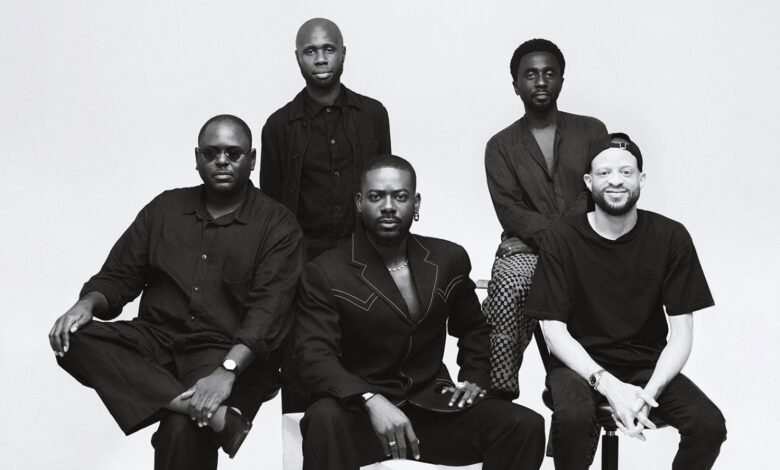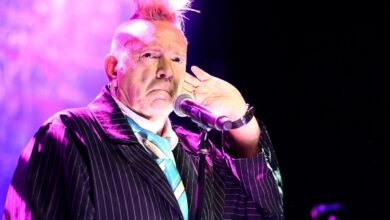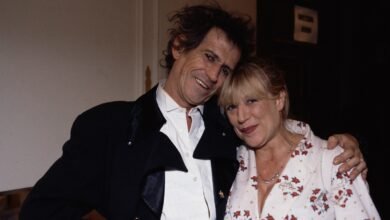‘Wizkid Now Was Sunny Adé Then’

In just three short years, Nigerian street-pop savant Asake has become a giant in African music, meeting Wizkid, Davido, and Burna Boy in a place it took them three times that span to reach. Whatsmore, much of Asake’s mythmaking happened in just 2022, with the absolute pandemonium of his debut Mr. Money With The Vibe. With Asake’s ubiquity, came reverence for a sixty year old Yoruba genre, fuji. Asake and his producer Magicsticks made their obsession with it clear through their crazed and complex beats, resonant layers of call-and-response, and spiritual undertones. His latest album, 2024’s Lungu Boy, closes with an explosive instrumental aptly titled “Fuji Vibe.” Amapiano’s dominance took shape as Asake ascended, and his wielding of it certainly drove him to the top, but his dedication to fuji made him one of a kind.
“Today, arguably it’s the only existing indigenous Nigerian music that is still relevant,” Bobo Omotayo says of fuji. Omotayo is an executive producer of The Odyssey, a forthcoming documentary on 100 years of traditional Yoruba music and how it laid the groundwork for Nigerian pop as we know it today. “We can see [fuji’s] influence in what we now call Afrobeats.” Omotayo calls himself a “cultural custodian,” and The Odyssey has allowed him to fixate at the intersection of three of his passions: Yoruba music, language, and religion. Previously, he curated exhibits on fuji in London and Lagos. “I wasn’t quite sure who would show up, but we had a lot of young Nigerians, young Ghanaians, and just young West Africans living in England, kids of migrants who have always wanted to learn a little bit more about where they’re from,” he says. “In Lagos on an annual basis, we do these massive, free concerts sponsored by some of Nigeria’s most well known brands. We just create a safe space for people to really enjoy indigenous music, because [it’s] really losing its roots.”
The Odyssey looks to other genres like sakara, apala, ajiwere, fuji, juju, and highlife to tell the story of a nation and its people striving to come into their own power. While the doc is Omotayo’s brainchild, he’s enlisted eclectic director Abba T. Makama, whose surreal takes on Nigerian life and culture have screened at Philadelphia’s BlackStar Film Festival, Toronto International Film Festival, Africa International Film Festival, and BFI London.
Together, after a cozy, expansive interview with Afrobeats star Adekunle Gold, they brought the singer into the fold as a producer as well. While Gold gives the work-in-progress a celebrity face and access to his famous contacts (they’re still working to secure the biggest contemporary stars for the film), the project is also personal. “I grew up on Yoruba music,” he says. “I listened to a lot of highlife, fuji. I listened to King Sunny Adé a lot, Ebenezer Obey, all these people. I had no choice, I just had to listen, because my dad played them every time. Being a part of this helps me tell a story of the sound that formed everything that I am today.”
The documentary is slated for release in 2025, with the team planning to take it to festivals before placing it with a streamer. “We’ve been filming for the last year,” Omotayo says. “We’re hoping to stop filming soon, because we have a ridiculous amount of footage we need to go through.”
Among their interview subjects are Chief Commander Ebenezer Obey himself, Seun Kuti, and many more OGs. “It’s one thing to grow up with music, it’s another thing to meet the people who’ve made the music,” says Omotayo. “One of the things that was really sad was that you just wish you got a chance to speak to them in their prime. In particular, Chief Commander Ebenezer Obey is a legendary Juju artist, one of the most prolific. I think he probably has 100 albums to his name. It was really humbling to hear about his childhood. He spoke about the stigmas around being a performer, because he grew up in a super Christian family, and it was really frowned upon. He had shared some of his parents’ fears about him becoming a performer, and it was a thing of pride for him to be able to say, ‘My parents were proud of me before they left this Earth.’”
Here, Bobo Omotayo, Abba T. Makama, and Adekunle Gold go deep on what they’ve learned about Nigerian politics in music, telling personal stories that are emotional, informative, and perhaps a little off-kilter, as well aa discussing where Afrobeats is headed.
I have so many questions – my first one is about the decision to focus exclusively on genres that you attribute to Yoruba people. Tell me more about that choice.
Bobo Omotayo: Okay, simple. I was raised by a politician, my mother. If you live in a politician’s household, you’re surrounded by a lot of people. So as a 7-year-old, I was always in rooms where music was a big, big part of the atmosphere. Everything from Yusuf Olatunji, who’s a major Sakara performer, to Haruna Ishola, who is a legendary Apala singer from my neck of the woods. I’m from Ijebu, which is a small tribe of people, to Fuji legends like, Abass Obesere. So for me, it was very much an opportunity to also, I guess, play a bit of nostalgia, dig into my past, use it to maybe answer some questions about who I am as a proud Yoruba man, and also pay homage to the many, many people who have given so much to the world of music.
I think about 18 months ago, I was really fascinated by really going back into Nigeria’s complicated parts, especially pre and during and post-Amalgamation [the formation of a single Nigerian colony by the British] in 1914, really thinking about how music was used as a tool by politicians. Music was used as a tool by religious missionaries to control people of Nigeria. It doesn’t have to be Yoruba in particular. And I think the best way for me to explore this was just think about, how about we just do a time span, time stamp, and just think about the last 100 years of the music, it’s various evolutions, celebrate the unsung heroes, because there are many, many, and really then think about how has it created this sound called Afrobeats.
The film seems set to argue that these traditional Yoruba genres are foundational to Afrobeats. Would you say then, this is only part of Afrobeats’ story if it primarily looks at just one ethnic group’s contributions?
Omotayo: Afrobeats has many, many influences, right? There’s a whole conversation around Fela’s music, which is Afrobeat, as the bedrock for something called Afrobeats. One of the things that a lot of us need to know is, Fela wore many influences on his sleeve. He was a classically trained musician, trained in New York, who trained in jazz, and who also was openly referencing a lot of Yoruba talents. I can only do what I can. I think taking one is an honest approach to interrogate in this conversation. I don’t think we’re going to come to a conclusion, because I don’t think there’s a conclusion, but what I think this allows us to do is just to shed a light into genres of music that have given so much to world music at large. I just decided that it’s best for us to be a little bit more focused, and that’s why we’ve chosen this. And what I love is Abba is not Yoruba, and I really think that’s a wonderful tool to really be objective in telling the story.
Abba T. Makama: I’ve also realized that as early as any recording of Yoruba pop music, it has always been an eclectic sound that borrowed from everywhere. So there’s influence from palm-wine music from Ghana, there’s influence from northern Nigeria in sakara. It’s always been eclectic in its evolution from the very foundation. Its roots come from traditional religion as well. So there’s that. Even though the documentary is focused on an ethnic group, that ethnicity borrowed from all over the place.
Who are the legends that you’ve talked to, and what those conversations have been like?
Omotayo: It was wonderful to speak to General Ayinla Kollington. This is one of the icons of fuji. This man was one of the people that I remember creating really iconic music videos in the ’80s. Really flashy, a lot of bling, a lot of costumes
Makama: [He’s] more of a record producer, but Odion Iruoje. People will call him the father of Afrobeats. He invented the genre with Fela, and we were very fortunate to get him. He’s in his 80s. He’s a bit frail, but he’s still there and we were able to chat with him. He just took us down a couple of rabbit holes and also spoke about the music business. This was someone who fought for artists to get paid royalties. In post-independence, you had all the major European and Western record labels – EMI, Polygram – they were all in Nigeria. It was [like] you just come, record a record, you perform, you get paid. That’s it, like a 9:00 to 5:00, you clock in. He was one of the guys who fought: ‘Yo, these people need to start getting royalties for their records.’
We enjoyed chatting with Burna Boy’s grandfather as well, who was also associated with Fela’s management, and then Mr. Kunle Tejuosho of Jazzhole record store [in Lagos], who is an encyclopedia of music in general. He was also a fun person to speak with.
What are some things that they were excited to celebrate or rehash with you?
Makama: Personal stories, because a lot has happened. I don’t know whether I am privy to share some of these stories. I just remember Mr. Tejuosho telling me how in the ’80s and ’70s, during the fuji boom, Yoruba musicians had never seen that level of money before, that some artists actually went crazy because of how much money was coming in. And this was also the era of vinyl. So you were literally counting how many records were sold. And in a country like Nigeria that didn’t have a formalized music industry, there were millions of records being sold.
I enjoyed when Ayinla Kollington was telling me how he was in the army. He joined the Army music band, and they were like, ‘Dude, you’re not supposed to be a soldier, you are supposed to be making music.’ People are looking for those special nuggets that you don’t hear from anywhere. That’s what I’m trying to share with this film.
Abba, you really seem to be interested in more avant-garde, creative takes on film. Tell me how you’re thinking about formatting this documentary?
Makama: My format is, there is no format. We’re creating it as we go, but there is a method to the madness of my creativity. I liken it the way I make films with the way I paint as well, because I’m an abstract expressionist when I’m painting. I’ll have an idea, I’ll have a structure, but my idea is there are no rules. You can still play around with stuff. For instance, we’re shooting multi-cam, shooting 4K, traditional talking heads, but I’m also walking around with my own digital video camera, filming BTS, filming what’s happening. I might play around with that aesthetic and throw it inside the edit, I don’t know yet.
While we’re filming, I kept on telling Bobo, “I think because you are such an authority, and so passionate about Yoruba culture and music, this film is also kind of about your journey as well.” And I told him, “Would you be willing to lend your voice as a narrator for this picture?” I think that will give it another personal touch and edge to it. I’m playing around with stuff; with animation, stock footage, all kinds of stuff.
Are there any films of any genre that feel particularly inspirational to all of you as you take on this project?
Makama: I’m a huge fan of what Vice used to do back in the day, in the early 2010s, with some of those shows like Action Bronson’s Fuck, That’s Delicious. Vice went to North Korea with [Dennis Rodman], the NBA [star]. I like that Gonzo style of documentary where the journalist throws himself inside there, and it’s his own quirky way of storytelling. I also like this documentary filmmaker for BBC, Adam Curtis, who uses visuals and voiceover. He doesn’t do talking heads, it’s just the most riveting images you are seeing, and very weird, creepy music and his voiceover. Sorry, I’m geeking out right now.
No, no, this is great.
Makama: I also like, [This is] Spinal Tap, a mockumentary. I like mockumentaries, like Borat, for instance, where you are not quite taking it seriously. I’m not saying this is what I’m doing with this, but those are the genre of films that I’m drawn to when I’m doing documentary films.
Adekunle Gold: I don’t make documentary films, but some of the [other] ones that I like are anything and everything [by] Ousmane Sembène
Makama: Yes. Senegalese legend.
Gold: I saw Sun Ra’s Space is the Place, [Senegalese drama] Touki Bouki; these are my type of films.
Has this work impacted your perspective on modern music at all? Knowing that you all are coming into the film with a pretty solid knowledge base, I’m wondering what this documentary project might’ve illuminated for you.
Omotayo: I think what I’ve learned is you can’t tell the story of Nigeria without telling the story of Nigerian music. We commissioned research from the University of Lagos, and a lot of their findings were about [how] a lot of the inspiration for the artists was what was going on in the country politically. It was very much songs of salvation, it was very much songs of freedom. It was very much [that] artists become social commentators about what was going on. That’s really what is recurring regardless of the genre, whether it’s sakara, or it’s apala, it’s fuji, or it’s juju, it’s always very much about singing about the plight of the average Nigerian. I think that’s going to be one of the things that I think might be really interesting as a storyline for the film.
Makama: What I’ve learned is history just keeps repeating itself. There’s nothing new under the sun. And it’s like, Wizkid now was Sunny Adé then. It’s like the archetypal themes that are being said. There’s rivalry between two powerful artists in every era. I also realize that there’s so many parallels between Fuji music and hip-hop music, the braggadociousness in Fuji and also battling as well. The battle in hip-hop, it’s also prevalent in Fuji music as well. I just like finding these parallels. We had a Shina Peters VHS [from] the ’90s, and this guy was decked out in I think a Gucci tracksuit with bling bling and huge sunglasses, just looking like a hip-hop star. I’m someone who’s a huge fan of Carl Jung, and Jung talks about the collective unconscious, and how these archetypes exist, and they’ve always predated us, and they just keep manifesting in different ways.
Can you say more about seeing Wizkid as or in parallel to Sunny Adé? I think that’s a really cool concrete example you could expand upon if you’re comfortable with.Makama: Well, just seeing the heights, well, it is not just WizKid, it could be Burna Boy, or whoever. There’s a video that Bobo shared where Sunny Adé is in a gold Rolls-Royce driving through Lagos. That could be any of these artists today. And he’s being interviewed by a journalist. It’s no different. Same way you had the Obey camp, you had the Sunny Adé camp, today, you can also have people saying, it’s Wizkid or Davido. Again, these archetypes, they keep coming up. And then there’s somebody who’s just on his own lane like Adekunle Gold or William Onyeabor, they’ve always been there. They’ve always been there.
Gold: I quite like that perspective, because basically what you’re saying is, there’s nothing that’s happening now that has not happened before. It’s just different eras, different times.
I want to go back to this idea of the foundations of these traditional Yoruba genres being very political, very social, whether music like Afrobeats is still that way whether the music is still that way. We’re seeing this debate in hip-hop and Black American pop music as well. People will argue that Afrobeats stars today aren’t political enough. What do you make of those conversations?
Omotayo: So between in the 1950s and pre-independence, there was just a lot of awareness being raised by musicians. Now, it would be interesting to know if that was record labels orchestrating that level of consciousness, or if this was just the artist themselves being self-aware. But at some point, the musicians were the most powerful voices. Technology was non-existent, as we know. There was no television. The only medium of communication people had in their homes in the ’50s and ’60s was really a radio. The musicians had real sway. They can influence how people voted, they can influence how people felt about a particular cause. You found that very reoccurring over the next couple of decades.
There was also a lot of religious consciousness happening around that time. In juju, for example, which was a genre of music that was associated with the Christian community, you found that the B side of their records were always either reinterpretations of popular Catholic or Anglican hymns made over a drum pattern to make it a little bit more danceable. On the other side, apala and fuji were more synonymous with the Islamic communities; you found a lot of Islamic chants in the music.
Now I have to say that if I think about the amount of consciousness that was coming out around that era, and what we are having today, it’s not quite the same. I don’t know why that is. I don’t know if it’s just that we’re maybe just a little bit happier now. A lot of what was fueling the struggle was a cry for democracy. So I don’t know if post-democracy, which is 1999, we just needed something else to focus on, because we had our civilian government, and life was supposedly better for all. I suspect that these things will 360. I suspect [if] they find an artist who is super conscious, [it] will perhaps start that whole chain again.
Gold: I think for different times music has served as anything. Say you go back all the way back, there are people that made music just for fun. It’s entertainment as much as it can be a social tool. I wouldn’t really put so much pressure on many artists that just do whatever they want to do with it. It is an expression. I write on social consciousness. Look at my catalog, there’s not one album that I’m not saying something. And there are a lot of people like me that make songs like this. But unfortunately the songs that make it to the light of the day that everybody sings about, talks about, or shares are the ones that are very surface level. And honestly, I’m not mad at it, because at the end, what do you do?
Nigeria has experienced significant economic and political instability in recent years, though. Is there anything that you’ve seen or learned while making this film that indicates that this could be fertile ground for a strong return to social consciousness in the music?
Makama: I’ll reiterate that music is subjective and it has different purposes. There’ll always be artists who are more conscious versus those who are doing it strictly for mass consumption. That will always be the case. We are in a very interesting era in history – I don’t know whether it’s the end of capitalism, or whether capitalism is morphing into something else. Then you also have to talk about the influence of technology. You literally have AI now that can make music for you. So there’s so much mediocrity within the market space, and therefore that makes people like AG and the more auteur driven artists have more longevity and spotlight. What I found interesting between the generations we spoke to is that some of the older heads kept on calling out the younger generation for doing a lot of this commercial music, but [another] much older person said that, “No, this thing has always existed.” You [always] had artists who had a bit more substance versus people who are making Pangolo music, as they will call it.
What does that word mean?
Gold: Pangolo is a tin [his manager chimes in to define “pangolo” as “cheap metal” which can be noisy]. So imagine just making noise with a tin. It makes no sense, right?
Makama: Also, a tin is empty. I know there’s going to be a [sort of] renaissance, for sure. I feel like it’s coming and it’s probably not just in Afrobeats, [but] there’s definitely going to be a renaissance of live recorded music. Younger kids are going to be playing more instruments. I think that revival is coming just because it’s going to be so basic to use tech to create. I remember 20 years ago when vinyl started becoming a thing again. Now almost everybody I know has a vinyl record player. Even some of the more contemporary Afrobeat artists drop limited prints of their records on vinyl as well. So there’s going to be that renaissance of live music, and that’s something that I really look forward to seeing.
“Made in Africa” is a monthly column by Rolling Stone staff writer Mankaprr Conteh that celebrates and interrogates the lives, concerns, and innovations of African musicians from their vantage point.
Source link




